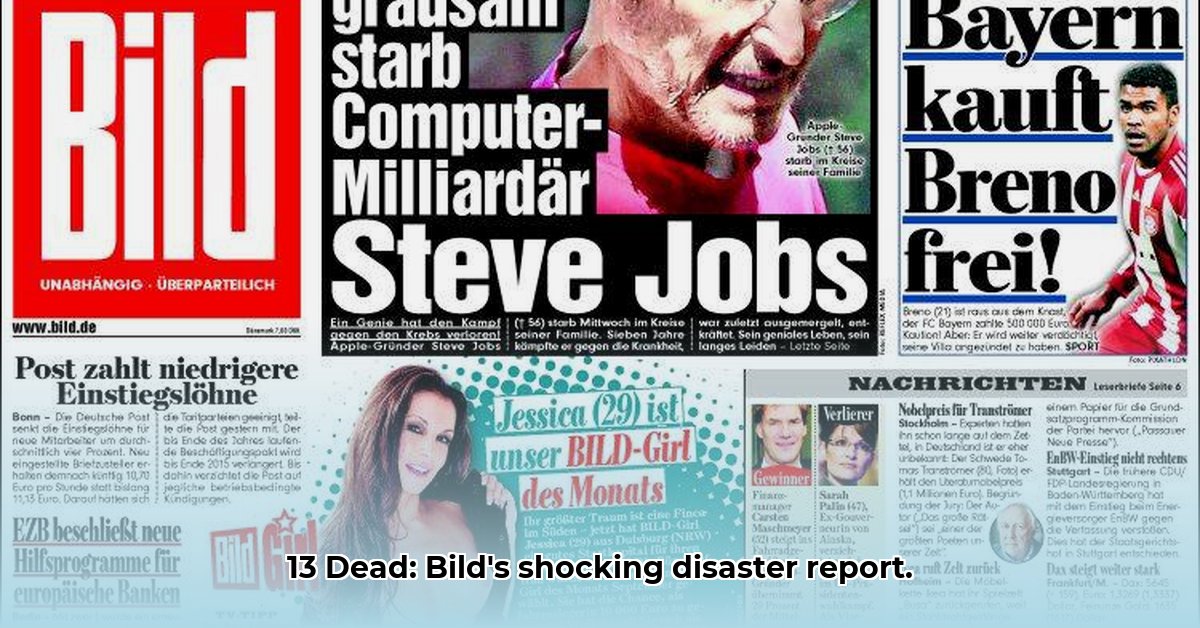
Bild Zeitung's Reporting: A Critical Analysis
Bild Zeitung, Germany's largest-circulation newspaper, frequently covers major news events. However, its reporting style – often criticised for sensationalism – raises questions regarding its effectiveness in conveying crucial information during disasters. This article examines Bild's coverage of two distinct events: a devastating Texas flash flood resulting in 13 deaths and a high-profile reckless driving trial in Germany, analysing its strengths and weaknesses and comparing its approach to those of more established news organizations.
The Texas Flash Flood: A Missed Opportunity for Impactful Reporting
Thirteen lives were tragically lost in a sudden Texas flash flood, with additional individuals reported missing. While Bild Zeitung reported the basic facts—the death toll, location, and brief mention of a summer camp impacted—its coverage lacked depth and contextual detail. The report failed to delve into the critical aspects of the disaster, such as the exact number of missing persons, the extent of the financial damage, and the human toll beyond the headline figure.
This superficial approach missed a crucial opportunity. Effective disaster reporting requires more than merely stating the facts; it needs to explore the underlying causes of the vulnerability—in this case, the susceptibility of the area to flash flooding, the efficacy of early warning systems, the adequacy of the emergency response, and the lessons learned for future prevention. Bild’s report disappointingly fell short in this regard.
Key Insights from the Texas Flood Coverage:
- Lack of depth: Bild provided only a superficial account, failing to investigate underlying causes or explore the human impact beyond the immediate death toll.
- Missed opportunity for preventative measures: The paper didn't explore how future incidents could be avoided or what preventative measures should be taken.
- Insufficient human interest: While the human element was acknowledged, the stories of those directly impacted were largely absent.
The German Reckless Driving Trial: Sensationalism Over Substance?
The German reckless driving trial, involving a young driver and a victim bearing impactful testimony, provided another opportunity for Bild to engage in responsible reporting. However, the paper's focus seemed to shift towards the driver's emotional state in court, rather than exploring the critical details of the accident itself. Information regarding the precise causes of the accident, the extent of injuries sustained, and the specifics of the legal proceedings remained scarce.
This missed opportunity to educate readers about responsible driving and the far-reaching consequences of reckless behaviour. Bild could have used the platform to highlight the role of driver education and promote road safety measures, but instead opted for a more sensational, less informative approach.
Key points from the reckless driving trial coverage:
- Emotional focus over facts: The coverage prioritized emotional aspects—the driver's reaction—over the key facts of the accident.
- Lack of educational value: No attempt was made to educate the public about road safety or responsible driving practices.
- Missing contextual information: The coverage lacked essential details about the accident itself and the legal proceedings.
Bild Zeitung and Disaster Reporting: A Need for Improvement
These two case studies reveal a pattern in Bild Zeitung's approach to disaster reporting. While it acknowledges the human element, the focus on sensationalism often overshadows the critical need for comprehensive and contextualized information. For better journalistic practice, Bild should improve its reporting by:
- Prioritizing in-depth investigations: Thoroughly investigating the circumstances surrounding disasters, exploring underlying causes and potential preventative measures.
- Incorporating multiple perspectives: Presenting a balanced picture that includes the voices and experiences of victims, emergency responders, and affected communities.
- Providing actionable information: Offering practical advice and resources to help the public prepare for and respond to similar events.
By embracing a more rigorous and responsible approach to disaster reporting, Bild Zeitung could significantly enhance its contribution to public awareness and help prevent future tragedies. The need for impactful and informative journalism, particularly in the aftermath of disaster, cannot be overstated. A balance between human interest and factual clarity is essential for effective reporting.